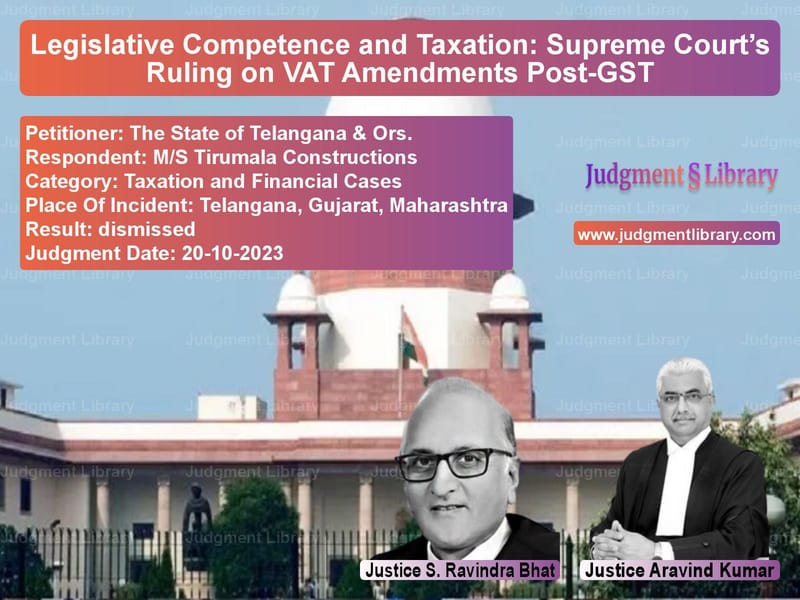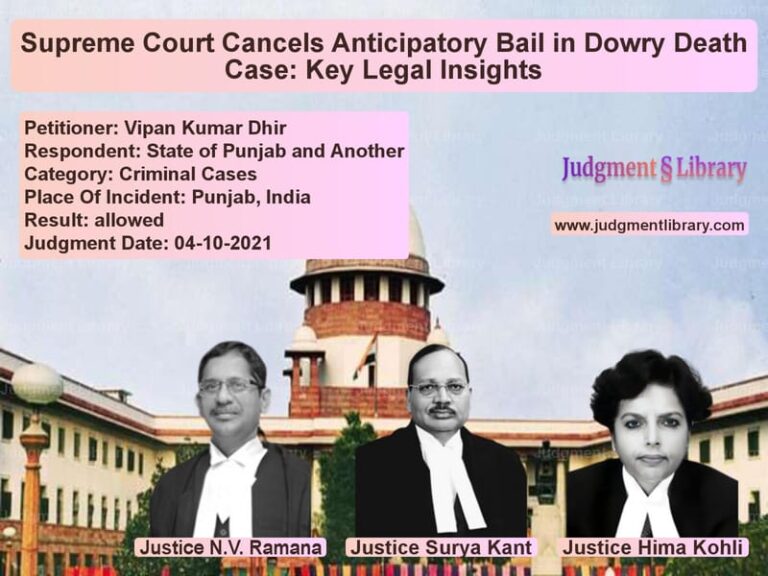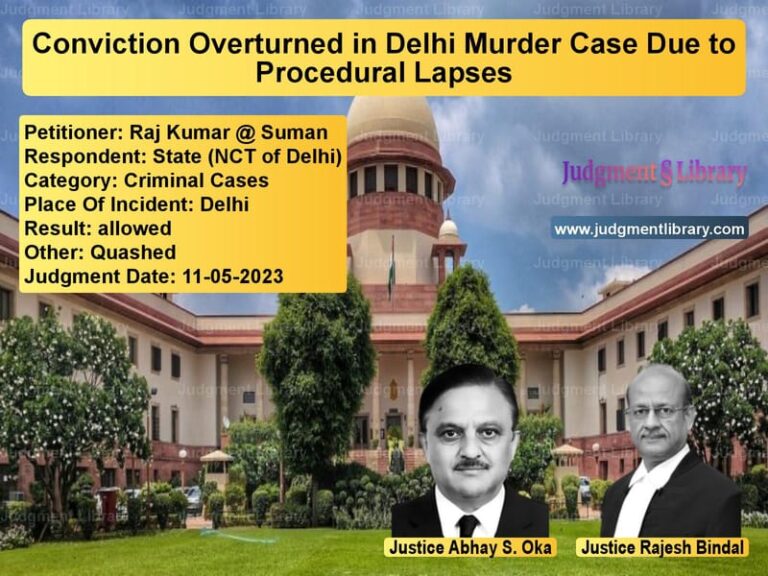Legislative Competence and Taxation: Supreme Court’s Ruling on VAT Amendments Post-GST
The Supreme Court of India recently delivered a significant ruling in The State of Telangana & Ors. vs. M/S Tirumala Constructions, addressing the validity of amendments to Value Added Tax (VAT) laws post-implementation of the Goods and Services Tax (GST) regime. The case revolved around whether states retained the power to amend their VAT laws after the introduction of GST, scrutinizing the provisions under Section 19 of the 101st Constitutional Amendment Act.
This ruling holds critical implications for businesses, taxpayers, and state governments as it clarifies the extent of legislative competence in indirect taxation post-GST. It underscores the need for legal precision in tax laws and prevents states from retrospectively amending tax laws that affect businesses unfairly.
Background of the Case
The dispute emerged from amendments made to the VAT Acts of Telangana, Gujarat, and Maharashtra. These amendments extended the limitation period for assessments and imposed pre-deposit requirements for appeals. The central question before the Supreme Court was whether states had the authority to enact such amendments after the implementation of GST on July 1, 2017.
GST, a comprehensive indirect tax reform, subsumed multiple state and central taxes, including VAT. The introduction of GST was accompanied by a transitional provision under Section 19 of the 101st Constitutional Amendment Act, which allowed states to continue levying and collecting VAT only for a limited time.
Petitioners’ Arguments (States of Telangana, Gujarat, and Maharashtra)
- The petitioners argued that states retained the power to amend their VAT laws as part of the transition to GST.
- They contended that Section 19 of the 101st Constitutional Amendment Act permitted amendments to VAT laws for pending assessments and tax recovery.
- The amendments were necessary to ensure a smooth transition and to prevent revenue loss.
- The power to amend VAT laws remained valid for transactions occurring before the GST implementation date.
Respondents’ Arguments (Tirumala Constructions & Others)
- The respondents contended that once GST was implemented, states lost their legislative competence to amend VAT laws.
- Section 19 of the 101st Constitutional Amendment did not permit retrospective amendments affecting businesses unfairly.
- Reopening finalized assessments through post-GST amendments violated the principle of legal certainty.
- Increasing pre-deposit requirements for appeals unfairly burdened businesses, making access to justice difficult.
Key Observations by the Supreme Court
The Constitution Bench of the Supreme Court made several critical observations:
1. Limited Legislative Power Post-GST: The Court ruled that after July 1, 2017, states no longer had the power to amend VAT laws beyond what was expressly permitted under the Constitution.
2. Scope of Section 19 of the 101st Amendment: The Court clarified that Section 19 was a transitional provision meant for the limited purpose of dealing with pre-GST liabilities. It did not permit fresh amendments beyond this scope.
Read also: https://judgmentlibrary.com/taxation-treaty-interpretation-and-the-mfn-clause-a-landmark-judgment/
3. Telangana’s VAT Amendment Struck Down: Telangana attempted to extend VAT assessments beyond the GST implementation date through an ordinance. The Court held that this was unconstitutional since the state’s legislative competence in VAT matters ceased post-GST.
4. Gujarat’s Retrospective Amendment Invalid: Gujarat had amended its VAT Act to reopen past assessments, even where businesses had already settled their dues. The Court ruled that such retrospective taxation was arbitrary and violated business interests.
5. Maharashtra’s Pre-Deposit Requirement Unconstitutional: Maharashtra imposed additional pre-deposit conditions for VAT-related appeals. The Court found this to be an unfair barrier to justice and struck down the provision.
Final Judgment
The Supreme Court ruled in favor of the respondents, holding that the amendments made by Telangana, Gujarat, and Maharashtra were unconstitutional. The key rulings were:
- States cannot amend VAT laws post-GST unless expressly permitted under transitional provisions.
- Retrospective taxation through VAT amendments is unconstitutional as it violates business rights.
- Pre-deposit conditions in Maharashtra’s VAT amendments were invalid as they imposed unreasonable financial burdens on businesses.
Implications of the Judgment
This ruling has several significant implications:
- Legal Certainty: The judgment reinforces the need for clear legislative boundaries, preventing states from arbitrarily amending tax laws post-GST.
- Protection for Businesses: The ruling safeguards businesses from retrospective taxation and arbitrary pre-deposit conditions.
- Clarification on State Powers: The Court established that states cannot extend or modify tax laws beyond the permitted transitional period.
- Uniformity in Taxation: The judgment ensures that all states follow the same rules regarding tax laws post-GST.
Conclusion
The Supreme Court’s ruling in The State of Telangana & Ors. vs. M/S Tirumala Constructions is a landmark decision clarifying the extent of state legislative power post-GST. The judgment prevents states from retrospectively amending VAT laws and ensures that businesses are not unfairly targeted with new tax liabilities. Moving forward, this ruling establishes a strong precedent for tax law interpretation in India, reinforcing the principles of fairness, legal certainty, and constitutional validity.
Petitioner Name: The State of Telangana & Ors..Respondent Name: M/S Tirumala Constructions.Judgment By: Justice S. Ravindra Bhat, Justice Aravind Kumar.Place Of Incident: Telangana, Gujarat, Maharashtra.Judgment Date: 20-10-2023.
Don’t miss out on the full details! Download the complete judgment in PDF format below and gain valuable insights instantly!
Download Judgment: the-state-of-telanga-vs-ms-tirumala-constru-supreme-court-of-india-judgment-dated-20-10-2023.pdf
Directly Download Judgment: Directly download this Judgment
See all petitions in Income Tax Disputes
See all petitions in GST Law
See all petitions in Tax Evasion Cases
See all petitions in Banking Regulations
See all petitions in Tax Refund Disputes
See all petitions in Judgment by S Ravindra Bhat
See all petitions in Judgment by Aravind Kumar
See all petitions in dismissed
See all petitions in supreme court of India judgments October 2023
See all petitions in 2023 judgments
See all posts in Taxation and Financial Cases Category
See all allowed petitions in Taxation and Financial Cases Category
See all Dismissed petitions in Taxation and Financial Cases Category
See all partially allowed petitions in Taxation and Financial Cases Category







